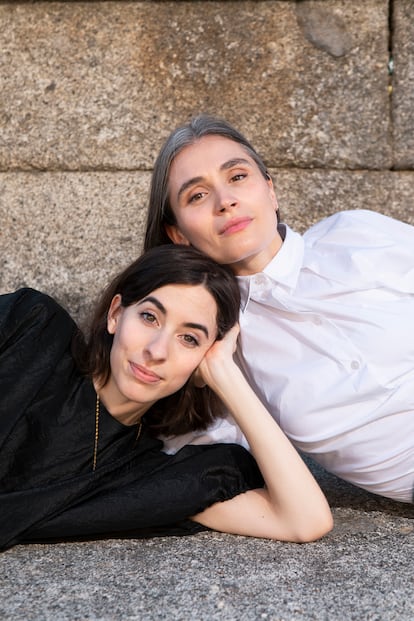The secret life of Baroque nuns: A story of lesbianism, mysticism and magic potions
Ana Garriga and Carmen Urbita present a podcast narrating the most obscure and gruesome aspects of cloistered life in the 16th century

There are friends who play at imagining which animal best represents them. Ana Garriga and Carmen Urbita, both 32, prefer to imagine what they would call themselves as professed sisters of the faith. “I would be Encarnación de la Paz,” Urbita says, “and Ana, Sister Petronila de las Llagas.” It would be a strange conversation were it not for the fact that the two friends host a podcast about grisly nuns with mystical visions, lesbianism disguised as sisterhood and soul-stirring magic potions cooked up in some convent or other in the 16th century.
They decided to christen themselves “Felipe’s Daughters” one day when, after taking a photo while studying for their doctorates in Providence, Rhode Island, they saw themselves reflected back pale, cadaverous and with dark circles under their eyes: they could not have imagined a more appropriate simile than with the descendants of Spanish King Felipe II (1527 – 1598). In truth, they look like Siamese twins separated at birth. Daughters of “very left-wing” secular and atheist parents, at the age of nine, and without having met each other, they both decided to be baptized. They later attended the same high school, but never spoke to each other. However, they both studied degree courses related to the history of literature and were equally fascinated by the writings of Baroque nuns. They finally met in 2016, when they undertook their PhDs in the United States. “It was an immediate crush,” Garriga admits.
Something similar happened when Garriga discovered Saint Teresa of Ávila and the censored version of her seminal work, The Way of Perfection. She was irremediably captivated by a single quote: “Because the rulers of the world are all men, sons of Adam, and there is no woman’s virtue to be suspected,” Garriga recites by heart: “I said: ‘Oh my! What a queen Saint Teresa is.’” Urbita was bewitched by a passage about the life of Jeanne des Anges, a 17th-century French nun possessed by demons: “And once you enter, you can never leave.”
In contrast to the official stories, the Hijas de Felipe – which is the name of their podcast – take the silenced characters and forgotten rituals from the footnotes, and mix them with references to current culture such as Soy Georgina, a Netflix documentary about Cristiano Ronaldo’s partner, or the enraged anthem of the Spanish feminist collective LasTesis.

Beyond explaining to their families and friends the baroque enchantment that surrounds them, Garriga and Urbita started the podcast in April 2020 for purely therapeutic reasons, sometimes on Zoom, sometimes finding a recording sanctuary in the bathroom of Garriga’s Rhode Island apartment, their time consumed by their doctorates. They were uneasy about the academic solemnity, the corseted language, the shy disclosure of their juiciest findings, such as the carnal relationship between the Theatine abbess Benedetta Carlini and Sister Bartolomea, or the time an elephant descended the stairs of the Madrid monastery El Escorial.
Although the podcast touches upon everything from 16th and 17th century fashion to access to housing, what Garriga and Urbita’s listeners really want is stories about nuns. “The sudden fascination with rediscovering stories of female convent life is generational. We approach it from a place of affection: we read and talk about these women as if they were friends,” says Urbita.
For them, the Baroque is a period of crisis and incomprehension. “When we talk about how we’ve been wandering the world, bilocated for many years, and we connect the nuns’ bilocation with today’s FOMO [fear of missing out], people feel alluded to.”
As of yet, they have not made enemies of the convents, but they have received a small rebuke from the curator of the Convent of Las Descalzas Reales in Madrid: “Please, do not refer to the polychrome sculptures as ‘reborns’ [hyper-realistic dolls].”
Sign up for our weekly newsletter to get more English-language news coverage from EL PAÍS USA Edition
Tu suscripción se está usando en otro dispositivo
¿Quieres añadir otro usuario a tu suscripción?
Si continúas leyendo en este dispositivo, no se podrá leer en el otro.
FlechaTu suscripción se está usando en otro dispositivo y solo puedes acceder a EL PAÍS desde un dispositivo a la vez.
Si quieres compartir tu cuenta, cambia tu suscripción a la modalidad Premium, así podrás añadir otro usuario. Cada uno accederá con su propia cuenta de email, lo que os permitirá personalizar vuestra experiencia en EL PAÍS.
¿Tienes una suscripción de empresa? Accede aquí para contratar más cuentas.
En el caso de no saber quién está usando tu cuenta, te recomendamos cambiar tu contraseña aquí.
Si decides continuar compartiendo tu cuenta, este mensaje se mostrará en tu dispositivo y en el de la otra persona que está usando tu cuenta de forma indefinida, afectando a tu experiencia de lectura. Puedes consultar aquí los términos y condiciones de la suscripción digital.








































